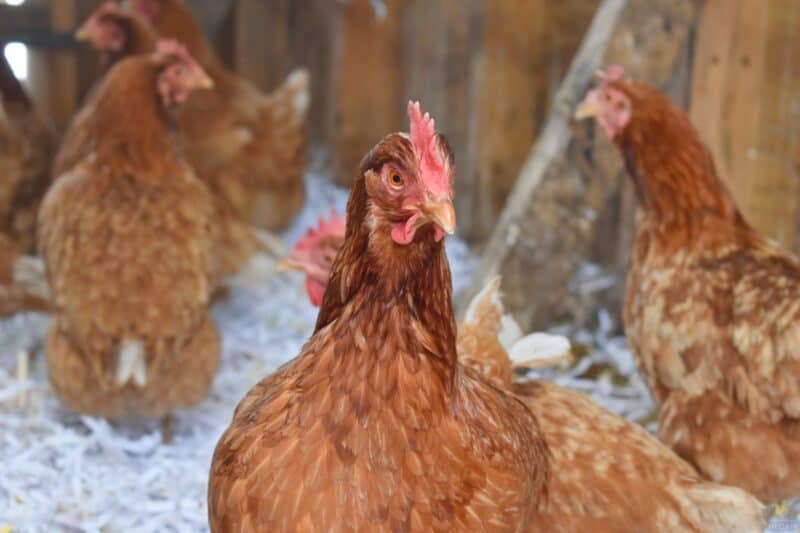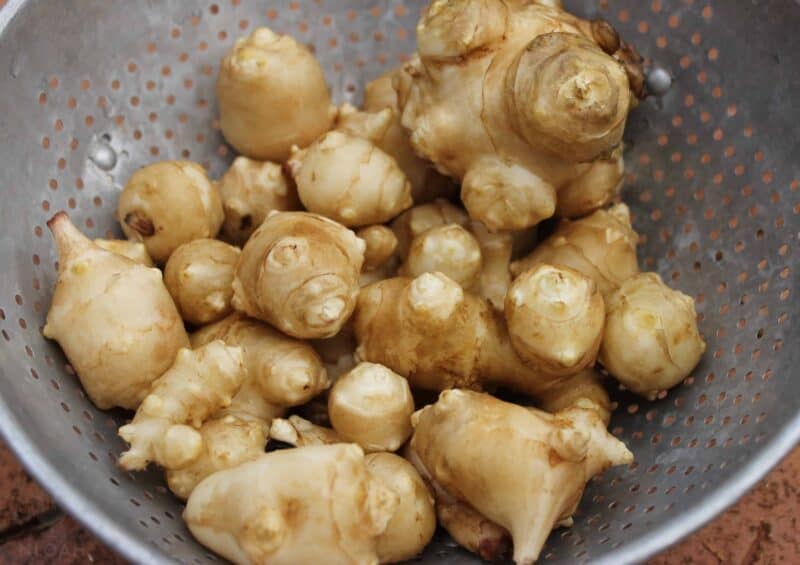There are all sorts of wild and cultivated vegetables making a regular appearance on your dinner table that are also good for chickens.

If you have owned a flock for any length of time, you already know what a varied diet they enjoy but they can still surprise you.
How about jerusalem artichokes? Can chickens eat those?
Yes, chickens may eat jerusalem artichokes and they are a healthy, nutritious supplement to their usual diet. Jerusalem artichokes contain abundant B vitamins, iron, and phosphorus and are a great source of energy for your flock.
Jerusalem artichokes neither come from jerusalem nor are they true artichokes, but are instead in the sunflower family and only distantly related to artichokes along with daisies.
Etymology aside, your chickens will get a lot from these tasty tubers, so keep reading to learn everything you need to know about serving them.

Nutritional Profile of Jerusalem Artichokes
Jerusalem artichokes, also known as sunchokes, all right tasty and surprisingly nutritious tuber that can be eaten or served as one would a root vegetable.
These tubers are packed with energy, mostly being carbohydrates and water by weight.
They also have a solid profile of B vitamins, particularly B1 but also good amounts of B2, B3 niacin, B5, B6 and folate.
| 100g Jerusalem Artichokes | Amount |
|---|---|
| Water | 78g |
| Calories | 73 kcal |
| Protein | 2g |
| Total Fat | 0.01g |
| Ash | 2.54g |
| Total Carbohydrates | 17.4g |
| – Dietary Fiber | 1.6g |
| – Sugars | 9.6g |
| Calcium, Ca | 14mg |
| Iron, Fe | 3.4mg |
| Magnesium, Mg | 17mg |
| Phosphorus, P | 78mg |
| Potassium, K | 429mg |
| Sodium, Na | 4mg |
| Zinc, Zn | 0.12mg |
| Copper, Cu | 0.14mg |
| Manganese, Mn | 0.06mg |
| Selenium, Se | 0.7µg |
| Vitamin C | 4mg |
| Thiamin | 0.2mg |
| Riboflavin | 0.06mg |
| Niacin | 1.3mg |
| Pantothenic acid | 0.397mg |
| Vitamin B-6 | 0.077mg |
| Folate, total | 13µg |
| Choline, total | 30mg |
| Vitamin A, RAE | 1µg |
| Carotene, beta | 12µg |
| Vitamin E | 0.19mg |
| Vitamin K | 0.1µg |
The mineral complement is also good, if limited.
Jerusalem artichokes contain tons of iron, a good amount of phosphorus and potassium, a little bit of magnesium and trace amounts of calcium.
Health Benefits of Jerusalem Artichokes for Chickens
Chickens will definitely benefit from eating jerusalem artichokes.
B complex vitamins are mandatory for good metabolic upkeep and cellular health, while iron is needed to produce new red blood cells and to oxygenate blood in the body, improving the cardiovascular system overall.
Phosphorus, the other standout mineral and the lineup is vital for maintenance of bones while potassium is needed to help balance electrolytes and maintain energy production.
Most interestingly, jerusalem artichokes contain micronutrients and other compounds that shows significant promise when it comes to improving digestion and chickens and stabilizing blood sugar levels.
At any rate, jerusalem artichokes are energy dense and a healthy way to give your birds extra calories and good nutrition in the bargain.
Can Chickens Eat Jerusalem Artichokes Raw?
Yes, your chickens may eat jerusalem artichokes raw, and assuming the tubers are not too tough or your birds are too small or too picky this is the best way to serve them.
Raw jerusalem artichokes maintain the very best nutritional profile, as cooking will deplete both B vitamins and minerals.
Can Chickens Eat Jerusalem Artichokes Cooked?
Yes, your chickens may eat cooked jerusalem artichokes.
Considering how tough they can be raw, this might be the best or indeed the only way to encourage your birds to eat them.
Chopping up jerusalem artichokes before pan-searing or roasting them, or even boiling them, is a great way to soften them prior to serving.
Never Feed Jerusalem Artichokes to Chickens that Has Been Prepared with Harmful Ingredients
Since we’re on the subject of cooking I must remind you to never serve jerusalem artichokes to your chickens if they have been prepared with any other harmful ingredients.
Harmful, in this case, means anything that your chickens cannot or should not eat.
Typical perpetrators include salt, sugar, various oils, excess butter and so forth.
Although many of these ingredients might not cause any ill effects in very limited quantities, chickens cannot have much of them at all before bad things start to happen.
Any calorie-dense food will result in weight gain and can potentially cause such serious illnesses as fatty liver hemorrhagic syndrome.
Sugars can also cause sour crop, another potentially fatal condition. Salt is also a big killer of chickens when they have too much in their diet, and salt poisoning is a grueling and horrible way for a chicken to die.
You might love your jerusalem artichokes prepared in any number of ways, but you should only give them to your birds plain cooked or raw, no additives!
Beware of Pesticide on Grocery-bought Jerusalem Artichokes
One thing to be aware of when purchasing grocery store-supplied jerusalem artichokes is the presence of pesticide residues or other chemicals.
Sadly, these days pretty much all types of produce are subjected to a continuous regimen of pesticide sprays and other chemical treatment in order to ensure they get as big as possible and to look as healthy as possible before making it to market.
Naturally, this will include jerusalem artichokes, and although sold as root vegetables and supposedly less subjected to this kind of treatment these residues cannot be ruled out.
Therefore you must take it upon yourself to thoroughly wash, soak or peel any jerusalem artichokes bought from the grocery before serving them to your chickens.
Many modern pesticides build up in organic tissues slowly over time, eventually resulting in serious health complications.
Chickens are particularly vulnerable to this bioaccumulation, so if possible you should buy organic jerusalem artichokes from the store or grow your own.
How Often Can Chickens Have Jerusalem Artichokes?
Jerusalem artichokes are a healthy snack and good source of energy for chickens, but that doesn’t mean they can eat them all the time.
Most experts recommend that chickens live primarily on their chicken feed, with around 90% of their calorie intake coming from it.
However, the remaining 10% should come from supplemental foods like treats and wholesome editions to their menu, including fruits and vegetables.
This means that you can give jerusalem artichokes to your flock a couple of times a week so long as they have a varied diet and are getting plenty of feed.
Preparing Jerusalem Artichokes for Your Flock
There are two approaches for preparing jerusalem artichokes for chickens.
If you have large and capable birds or softer jerusalem artichokes, you can give them raw.
We’ll have to expend some effort and energy to pick at the tough tubers, but they will tear off little bites and swallow them.
On the other hand, if your birds are picky or you just want to give them a treat that is easy to eat you should gently cook the artichokes to soften them prior to serving.
Chopping them into small pieces before pan-searing them, roasting them or boiling them will soften them up in no time.
As always, make sure you allow any cooked jerusalem artichokes to cool adequately prior to serving them to your birds.
Can Baby Chicks Have Jerusalem Artichokes, Too?
Yes, baby chicks may have jerusalem artichokes as a treat starting at around 6 weeks of age, but these tough tubers will likely prove to be proof against their small and underdeveloped beaks.
Accordingly, you’ll need to give them a hand if you want them to enjoy themselves. Boiling and mashing jerusalem artichokes is one way to accomplish this, as is grating them into tiny pieces.
As usual, keep a close eye on chicks after feeding them jerusalem artichokes for the first time. Their digestive systems are sensitive to new, novel foods.
Make Sure You Clean Up After Feeding Jerusalem Artichokes to your Flock
Just another reminder, like with all fresh produce make sure you clean up the scraps and little bits of artichoke left over after your birds are done eating it.
Fresh produce will begin to rot and decay quickly, especially in the heat, and this can make your birds sick if they decide to come back around later and take a bite of a nasty tuber.
You don’t want your birds to get sick, and you also don’t want any pests to be attracted by the smell of rotting garbage, so clean up right away after meal time.
Tom has lived and worked on farms and homesteads from the Carolinas to Kentucky and beyond. He is passionate about helping people prepare for tough times by embracing lifestyles of self-sufficiency.
